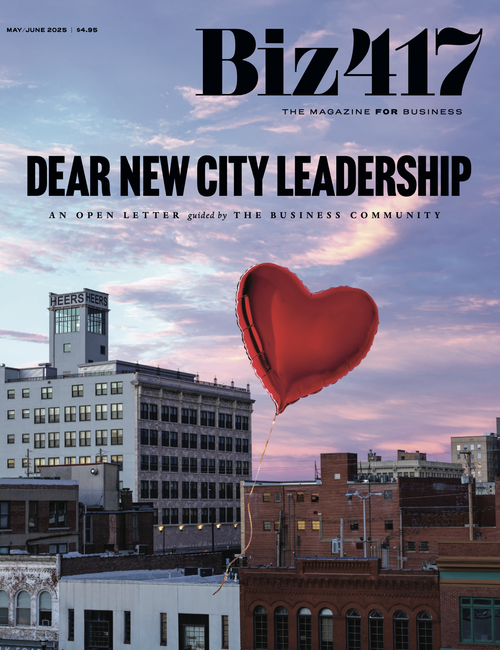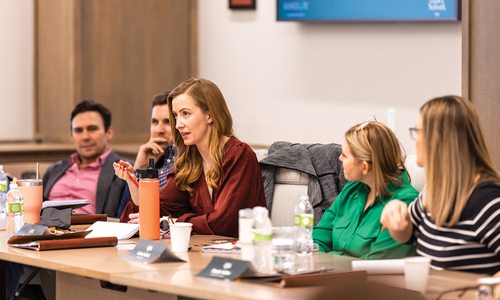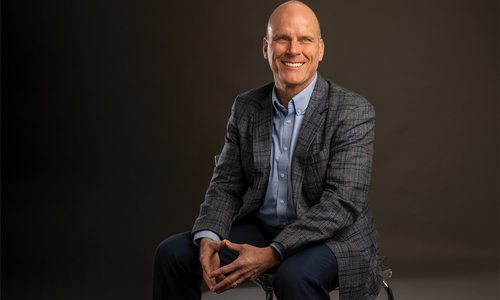
Leadership
Peek Into the Mentorship Between Kirk Elmquist and Dan Reiter
After working together for five years, these Springfield sports icons continued their mentorship and deepened their friendship.
By Claire Porter
Jan 2019

Biz 417: How did you two first connect with each other?
Kirk Elmquist: Dan applied for a job with the Springfield Cardinals in 2004. He was the last salesperson we hired.
Dan Reiter: Still to this day, it’s the only interview I’ve ever had with the Cardinals. My entire career has been based on one interview.
KE: One thing I always hire on is personality. You can’t buy it; you can’t borrow one. You either have one or you don’t. I hire on attitude. He just nailed it.
Biz: What formed the basis of your mentorship relationship?
DR: I think because he invested in me right away I was more excited to work even harder for him.
KE: We got past the boss-employee thing pretty quickly. You first have to like somebody; if you don’t like them, nothing else will happen. You second have to trust somebody, and the trust happened pretty quickly. And then you buy what they’re saying. And he exemplified that quicker than anyone else I’ve been around.
Biz: How did you handle the transition when you no longer worked together?
DR: When he left, I was lost for a while. When he said he was leaving, I was so stunned because I literally had not considered the possibility of not showing up and being next to him at work every day.
KE: But you know what’s neat is our relationship has probably doubled in strength since I’ve left. Now I’m impartial. He doesn’t have the professional accountability to me. He has the friendship accountability, like I have to him. The personal side is fun. When he gets an award, hopefully I’m one of the first ones to text him. I have a lot of pride seeing him successful.
Biz: Dan, what lessons have you learned from your time with Kirk?
DR: When I first started, I was 24-years-old of raw energy and zero polish. It was enthusiasm that carried me for a long time. He was the one that taught me professionalism. I am so fortunate that I got to work with someone who has such similar personality traits because it makes it so much easier to learn. And you also can take more ownership of who you are as a person. Mom and dad taught me ethics and morals, and Kirk taught me to be a professional.
[Kirk taught me] that it was okay to be loud and authentic. So many people teach you to follow the script, to tone it back down. And his style that made him successful was, when he would get in front of a group of people, whether it was five or 500, it was, “Let’s have fun.” And that was invigorating, to look at my friends who had jobs where too much creativity was frowned upon. I was like, “No, I’ve got this guy who’s telling me to get louder, to get bigger, to get in front of more people.” All of those things really helped me grow because it was encouraged, and it was fun. Loud and authentic is a great way to live life if you ask me.
Biz: What traits do you admire in each other?
KE: Dan never shied away from any challenge. That was exciting, because it can be a lot of pressure, and he could handle pressure. We identified pretty early as an organization that he’s a leader, and that was fun to be around.
DR: And he encouraged it. I tell people now, I don’t treat people equally, and I think it’s crazy to try to treat people equally in the workplace because someone is your hardest worker, and you should treat them like they’re your hardest worker.
Biz: What strategies did you learn from each other?
KE: He’d come in [representing] a collective of six people and their complaints. They’d send him out, and that told me everything I needed to know. If he was coming in, I already knew my answer. I knew that we had somebody who had passion about it, so I would just shut up and listen. I would literally listen; never react. React later. Listen. He’s not going to come in and lie to me. He would come in almost representing the majority knowing he wasn’t in the majority. I have respect for him in a way because he really wasn’t included in what he was fighting for. He didn’t need to come in and plead his case for me. He was pleading the case for those who couldn’t come talk to me.
DR: Well, I was accountable. Every day that I worked for you, I was accountable. In five years, there wasn’t a lied that I told.
KE: That built the trust. It was almost fun listening to him, to watch Dan grow. That was a brotherly, a fatherly pride that I had.
Biz: Kirk, Jack Stack was your mentor. What did you take from that mentorship and apply to this one?
KE: My fascination with Jack was the guts that he had to make his dream work and make a company successful when he had all the odds in the world against him. I think what I took from him was don’t ever accept being told no. What [else] did I take from him? Jack is one of the most charismatic leaders in our community, and you would have to go a long way to find someone with his heart for others. (Editor’s note: Coincidentally, Jack Stack walked into Maso right as we were having this discussion.)
Biz: What’s the key to a successful mentorship?
DR: The last 10 years, we’ve elected to stay close; we’ve elected to stay in touch, and I think you can only say that if you genuinely care for the other person. And that’s why we hug, we don’t shake hands. And that’s, I think, what you need. If you’re going to look for a mentor, you need someone you can genuinely care about.












